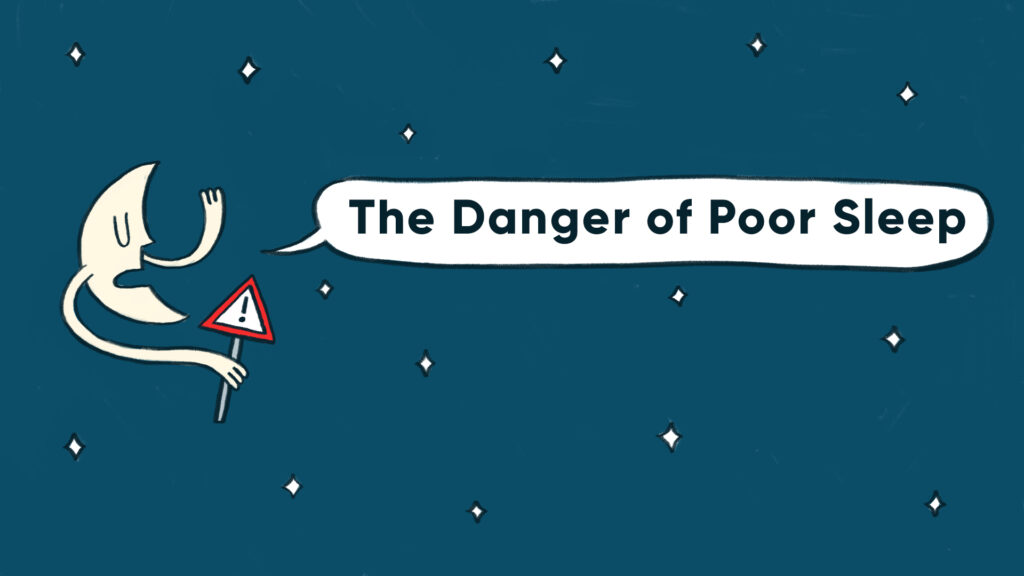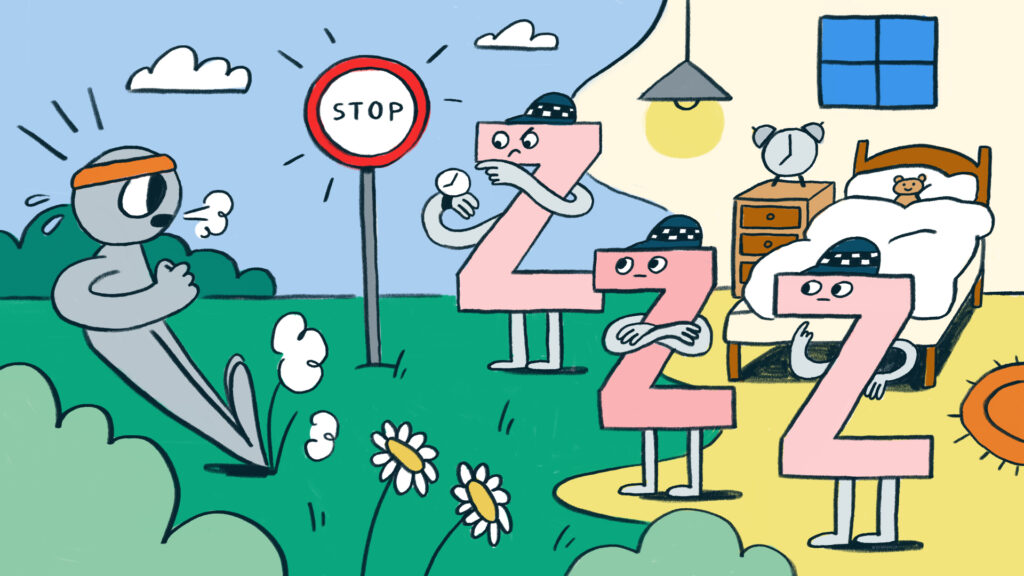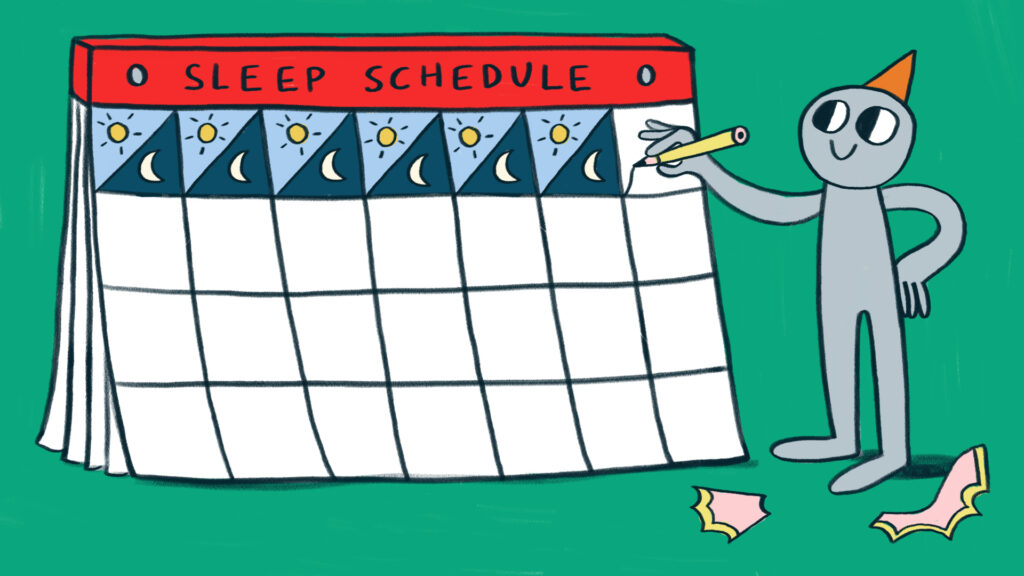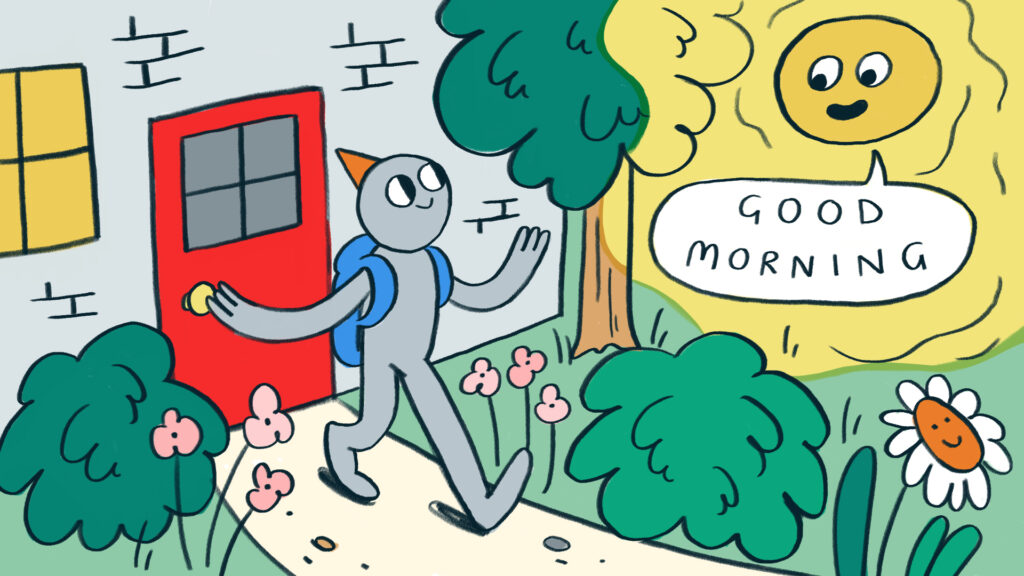
Sleep poorly, and you die sooner.1 Hooked? I hope so. Poor sleep increases the risk of cardiovascular disease, obesity, and cancer.2 Poor sleep harms your cognitive performance, with some studies equating a very bad night’s sleep to being drunk.3
However, there is an enormous amount of “sleep” information. Podcasts, YouTube videos, website posts, books, what is the real answer? How can we improve our sleep and improve our lives? What are the most common mistakes people make regarding sleeping correctly? What does the evidence support? Are blue-blocking glasses worth it? Does walking outside in the morning affect our sleep? How long do I need to wait after eating or exercising to sleep?
Well, I read all of it; the books, the podcast transcripts, the academic journals, and I even spoke to some Sleep Doctors to find the best answers as shown by the evidence. In this post, I’ll tell you why your sleep sucks (and how to improve it).
As a quick caveat, before I get into my findings, I want to reiterate what I like to say before these evidence-heavy posts. This is not medical advice; if you have a clinically significant disorder and haven’t gone to a doctor, go to a doctor. If you have gone to the doctor, listen to them. Follow their instructions and don’t stop or change anything you are doing based on this post. Feel free to talk to them about what I say, however. Finally, I am partaking in many biases creating this video, including heavy confirmation bias. Look at my sources, do your research, and make your own decisions. With that, let’s get into it!
The Evidence
The first paper I mentioned looked at 21,000 twins over 18 years old and had them fill out a questionnaire; the twins were then compared on sleep length, sleep quality, and use of hypnotics and tranquilizers. Adjustments were made for lifestyle and sociodemographic factors, and, amazingly, here are the results:
Short sleep (<7h), men had 26% increased mortality risk and women 21%. Frequent use of hypnotics and tranquilizers increased mortality risk by 31% in men and 39% in women. Interestingly, although lower numbers, there was also an association between sleeping more extended (>8 hours) and increased mortality risk compared to sleeping between 7 and 8 hours per night.1 However, this could be because people who sleep longer have low-quality sleep. For example, many people with sleep apnea sleep >9 hours simply because they never get deep sleep due to being awoken multiple times throughout the night because they can’t breathe.
We cannot live without sleep; sleep-deprived rats die in 2 to 3 weeks.4 In another study relating sleep and hypertension, people that sleep less than 6 hours a night, compared to those that sleep 7-8 hours, have nearly twice the risk of having hypertension (odds ratio 1.6-1.8).5 Finally, sleeping poorly has been associated with more significant breast cancer, colorectal cancer, and prostate cancer risks.6-8
And these are just things that can kill you; what about depression and cognition? Poor sleep is associated with decreased happiness levels, reduced exam performance, and increased levels of reported depression.9
Improving your sleep can significantly change your quality and length of life
Things that Harm Sleep

The rest of the tips center around a basic understanding of the human circadian clock and its significant regulators of it. Light, specifically of a specific wavelength and strength, seems to be one of the greatest regulators. Other major regulators include exercise, melatonin, feeding, and temperature.10 Finally, it’s essential to understand some chemicals contribute to sleep: adenosine contributes to “sleep pressure,” or the increased desire to sleep; melatonin rises about two hours before bedtime to assist in getting your body to sleep, and cortisol levels are greatest in the morning and contribute to a more awake and alert state. Of course, more chemicals contribute to your body, but at a basic level, the interplay of these three molecules determines when you sleep.
First and foremost, the biggest mistake is not speaking to a sleep specialist doctor if you are suffering significantly. Otherwise, here is what experts around the world recommend. Most of these are based on the fundamental tenets of sleep hygiene recommended by the National Sleep Foundation and evidence from world-class academic journals.12 Here is what you are doing wrong:
- Not ruling out medical contributions to poor sleep (medication side effects, psychiatric or physical disorders)
- Not measuring your sleep (how do you know if you’re not sleeping correctly if you are not measuring it?)
- Using electronics 30 minutes before bed.
- Listening to noise within two hours of bed.
- Napping more than 30 minutes during the day.
- Exercising within the five hours before bed.
- Sleeping in an improper environment
- Avoiding bright light until later in the day
- Using substances at all such as alcohol, caffeine, and cigarettes. The use of these close to bed is even worse.
- Not using your bed for only sleep or sex
Let’s fix it. What should we be doing?
Everything that Helps Sleep
According to the consensus Conference Panel from 2015, adults between 18-64 should sleep between 7 and 9 hours per night.11 Are you sleeping that much? More? Less? Across the board, it’s been shown that you are harming your health if you aren’t sleeping this much.
Let’s break down how to get the best night’s sleep possible.

1. Take stock of your sleep, keep a sleep diary for two weeks
In this diary log:
- Time you went to bed
- Time you fell asleep
- Number of times you woke up during the night
- Amount of time it took you to fall back to sleep
- Time you woke up in the morning
- How long it took you to get out of bed
- Number and duration of naps during the day
- Morning and nighttime routine
- Alcohol, caffeine, and medication use.
- Level of alertness during the day
This is going to be painful! But it will help identify where your actual issues in sleep are. Plus, these data will be beneficial if you need to speak with a doctor about your sleep issues.
2. Track your sleep with actigraphy
Actigraphy is simply tracking your sleep with electronic applications or devices. Notably, the accuracy around these tracking methods is nowhere near as accurate as a proper sleep study done with your doctor, but it can be an excellent place to start. Any wearable will do, as the OURA ring or FitBit will do.
Input this actigraphy data into your sleep journal to see if you can relate certain habits to “sleep quality.” For example, I use the Sleep Timer on my phone and notice that my sleep quality drops 10-20% when I eat immediately before bed.
And, again, if you ever need to see a doctor, this data will be beneficial.
3. Use evidence based lifestyle changes (“Sleep Hygiene”)

Onto the reason you clicked on this video, the guidelines.
Here are the most well-supported techniques for increasing sleep quality:
- Consistently schedule your sleep. Religiously stick to a sleep schedule with the same bedtime and wake time, even on the weekends. Many things are at play here, including regulating your hormone cycles and classical conditioning, to name a few.
- Practice a bedtime routine. Studies show sleep routine interventions can improve sleep duration. Before going to bed, I read, clean my apartment, shower, and brush my teeth, all in extreme darkness (only in candlelight).
- Avoid electronics at least 30 minutes before bed; the blue light from many screens can suppress melatonin production.13 This is where blue-light-blocking glasses may come in handy if put on a couple of hours before bed because it seems the shorter wavelengths of visible light (blue light) have a more significant impact on keeping us awake than the longer wavelengths of visible light (red light).
- Exercise during the day, but not within 5 hours of going to bed. Exercising during the day has been shown to help with the ability to fall asleep and sleep quality; however, if we exercise too close to bed the molecules released during exercise such as norepinephrine, can keep us awake.
- Optimize your sleep environment. Make your bedroom colder than you think; some studies lean towards a temperature of about 65 degrees. However, the biggest harm to sleep is if it is too light or loud. If necessary, use blackout curtains, ear plugs, and sound machines, close the windows or consider changing your sleep environment.14,15
- Have a warm shower or bath 1-2 hours before sleep. One study indicates doing this 1-2 hours before bed can decrease the time it takes to fall asleep and increase sleep quality. The idea is that the warm shower reduces core body temperature by increasing blood perfusion to the palms and soles, increasing distal to the proximal skin temperature gradient, and enhancing the heat leaving our body.16
- Do not look at the clock if you can’t go to sleep. Instead, go into another room and relax, like reading a book, until you feel tired enough to sleep again and then return to bed. Again, this is because we don’t want to associate in any way bed with the inability to sleep.
- Avoid napping greater than 30 minutes during the day. Naps of 10-20 minutes may provide cognitive benefit; however, when we nap over 30 minutes, we create sleep inertia, harming our cognitive abilities and affecting our ability to fall asleep later in the night.17-20
- Stop consuming caffeine, nicotine, and alcohol. Dramatic, I know, but if you have a severe problem, you need to take serious action. Another option is no alcohol within 5 hours of sleep, nicotine within 6 hours, and caffeine within 8 hours. The issue with all of these drugs, because they are drugs, is they have long half-lives (except alcohol), which means they stick around in your body for long periods. Caffeine’s half-life is about 5 hours, and nicotine’s half-life is about two hours. Alcohol is eliminated at zero-order kinetics, meaning the amount you consume doesn’t affect the rate it is eliminated from your body. Still, try to avoid alcohol, any alcohol, within 4 hours of sleep.25-27
- Expose yourself to the morning light. Exposure to morning lights sets up the beautiful cascade of cortisol and other chemicals involved in sleep and alertness. We want this cascade to start right when we wake up so it can begin to trail off as we get closer to bed. The issue is when we don’t expose ourselves to early morning light, this cascade doesn’t begin until later in the day, meaning we won’t fall asleep until later, creating an awful feedback loop. Importantly, it would be best to hit certain brightness levels before these cascades are activated. Here are the scientist’s recommendations: within one hour of waking up, expose yourself to bright light; if it’s sunny outside with no clouds, 5-10 minutes, slightly cloudy for 10-20 minutes; densely cloudy for 30 minutes. It takes 6 hours of normal indoor light to reach the required light levels (too long).19-24
Conclusion
Nearly all the evidence points towards poor sleep being associated with poor health. This means everything from depression and happiness to cancer and death. Getting your sleep in order, if it is out of order, will change your life.
Sweet dreams!
Work Cited:
- Christer Hublin, MD, PhD, Markku Partinen, MD, PhD, Markku Koskenvuo, MD, PhD, Jaakko Kaprio, MD, PhD, Sleep and Mortality: A Population-Based 22-Year Follow-Up Study, Sleep, Volume 30, Issue 10, October 2007, Pages 1245–1253, https://doi.org/10.1093/sleep/30.10.1245
- Hölzel, Britta K., et al. “Stress reduction correlates with structural changes in the amygdala.” Social cognitive and affective neuroscience 5.1 (2010): 11-17
- Shochat T, Cohen-Zion M, Tzischinsky O. Functional consequences of inadequate sleep in adolescents: a systematic review. Sleep Med Rev. 2014 Feb;18(1):75-87. doi: 10.1016/j.smrv.2013.03.005. Epub 2013 Jun 24. PMID: 23806891.
- Rechtschaffen, Allan, and Bernard M. Bergmann. “Sleep deprivation in the rat: an update of the 1989 paper.” Sleep: Journal of Sleep and Sleep Disorders Research (2002).
- Gottlieb, Daniel J., et al. “Association of usual sleep duration with hypertension: the Sleep Heart Health Study.” Sleep 29.8 (2006): 1009-1014.
- Kakizaki, M., et al. “Sleep duration and the risk of prostate cancer: the Ohsaki Cohort Study.” British journal of cancer99.1 (2008): 176-178.
- Kakizaki, M., et al. “Sleep duration and the risk of breast cancer: the Ohsaki Cohort Study.” British journal of cancer99.9 (2008): 1502-1505.
- Thompson, Cheryl L., et al. “Short duration of sleep increases risk of colorectal adenoma.” Cancer 117.4 (2011): 841-847.
- Walker MP. The role of sleep in cognition and emotion. Ann N Y Acad Sci. 2009 Mar;1156:168-97. doi: 10.1111/j.1749-6632.2009.04416.x. PMID: 19338508.
- Morris CJ, Aeschbach D, Scheer FA. Circadian system, sleep and endocrinology. Mol Cell Endocrinol. 2012 Feb 5;349(1):91-104. doi: 10.1016/j.mce.2011.09.003. Epub 2011 Sep 10. PMID: 21939733; PMCID: PMC3242827.
- Consensus Conference Panel, Watson NF, Badr MS, et al. Recommended amount of sleep for a healthy adult: A Joint Consensus Statement of the American Academy of Sleep Medicine and Sleep Research Society. J Clin Sleep Med 2015; 11:591.
- National Sleep Foundation. Healthy Sleep Tips, 2016. Available at: https://sleepfoundation.org/sleep-tools-tips/healthy-sleep-tips
- Wood B, Rea MS, Plitnick B, Figueiro MG. Light level and duration of exposure determine the impact of self-luminous tablets on melatonin suppression. Appl Ergon. 2013 Mar;44(2):237-40. doi: 10.1016/j.apergo.2012.07.008. Epub 2012 Jul 31. PMID: 22850476.
- Ohayon MM, Milesi C. Artificial Outdoor Nighttime Lights Associate with Altered Sleep Behavior in the American General Population. Sleep. 2016 Jun 1;39(6):1311-20. doi: 10.5665/sleep.5860. PMID: 27091523; PMCID: PMC4863221.
- Perron S, Tétreault LF, King N, Plante C, Smargiassi A. Review of the effect of aircraft noise on sleep disturbance in adults. Noise Health. 2012 Mar-Apr;14(57):58-67. doi: 10.4103/1463-1741.95133. PMID: 22517305.
- Haghayegh, S., Khoshnevis, S., Smolensky, M. H., Diller, K. R., & Castriotta, R. J. (2019). Before-bedtime passive body heating by warm shower or bath to improve sleep: A systematic review and meta-analysis. Sleep medicine reviews, 46, 124–135.https://doi.org/10.1016/j.smrv.2019.04.008
- Hilditch CJ, Centofanti SA, Dorrian J, Banks S. A 30-Minute, but Not a 10-Minute Nighttime Nap is Associated with Sleep Inertia. Sleep. 2016 Mar 1;39(3):675-85. doi: 10.5665/sleep.5550. PMID: 26715234; PMCID: PMC4763354.
- McDevitt EA, Duggan KA, Mednick SC. REM sleep rescues learning from interference. Neurobiol Learn Mem. 2015 Jul;122:51-62. doi: 10.1016/j.nlm.2014.11.015. Epub 2014 Dec 11. PMID: 25498222; PMCID: PMC4704701.
- Ruggiero JS, Redeker NS. Effects of napping on sleepiness and sleep-related performance deficits in night-shift workers: a systematic review. Biol Res Nurs. 2014 Apr;16(2):134-42. doi: 10.1177/1099800413476571. Epub 2013 Feb 13. PMID: 23411360; PMCID: PMC4079545.
- Najjar RP, Wolf L, Taillard J, Schlangen LJ, Salam A, Cajochen C, Gronfier C. Chronic artificial blue-enriched white light is an effective countermeasure to delayed circadian phase and neurobehavioral decrements. PLoS One. 2014 Jul 29;9(7):e102827. doi: 10.1371/journal.pone.0102827. PMID: 25072880; PMCID: PMC4114570.
- Corbett RW, Middleton B, Arendt J. An hour of bright white light in the early morning improves performance and advances sleep and circadian phase during the Antarctic winter. Neurosci Lett. 2012 Sep 13;525(2):146-51. doi: 10.1016/j.neulet.2012.06.046. Epub 2012 Jun 26. PMID: 22750209.
- Bedrosian TA, Nelson RJ. Timing of light exposure affects mood and brain circuits. Transl Psychiatry. 2017 Jan 31;7(1):e1017. doi: 10.1038/tp.2016.262. PMID: 28140399; PMCID: PMC5299389.
- Ennis GE, Moffat SD, Hertzog C. The cortisol awakening response and cognition across the adult lifespan. Brain Cogn. 2016 Jun;105:66-77. doi: 10.1016/j.bandc.2016.04.001. Epub 2016 Apr 20. PMID: 27105036; PMCID: PMC4888875.
- Lanca C, Teo A, Vivagandan A, Htoon HM, Najjar RP, Spiegel DP, Pu SH, Saw SM. The Effects of Different Outdoor Environments, Sunglasses and Hats on Light Levels: Implications for Myopia Prevention. Transl Vis Sci Technol. 2019 Jul 18;8(4):7. doi: 10.1167/tvst.8.4.7. PMID: 31360613; PMCID: PMC6656201.
- Winek CL, Murphy KL. The rate and kinetic order of ethanol elimination. Forensic Sci Int. 1984 Jul;25(3):159-66. doi: 10.1016/0379-0738(84)90189-0. PMID: 6745819.
- Le Foll B, Piper ME, Fowler CD, Tonstad S, Bierut L, Lu L, Jha P, Hall WD. Tobacco and nicotine use. Nat Rev Dis Primers. 2022 Mar 24;8(1):19. doi: 10.1038/s41572-022-00346-w. PMID: 35332148.
- Benowitz, Neal L. “Clinical pharmacology of caffeine.” Annual review of medicine 41.1 (1990): 277-288.
